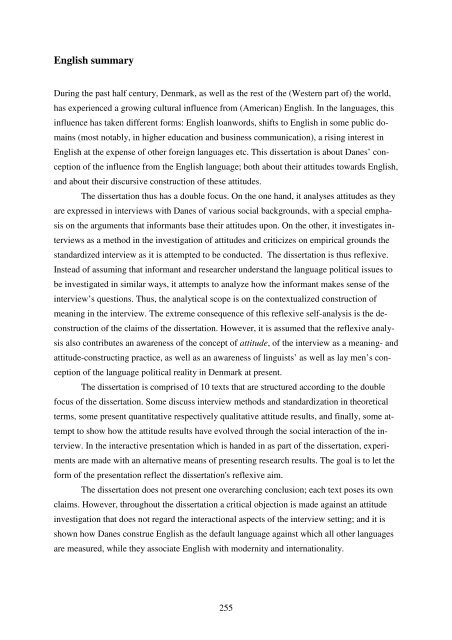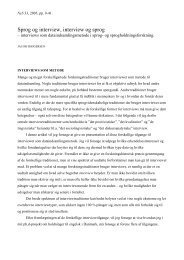Hør dog hvad de siger - Note-to-Self: Trials & Errors
Hør dog hvad de siger - Note-to-Self: Trials & Errors
Hør dog hvad de siger - Note-to-Self: Trials & Errors
Create successful ePaper yourself
Turn your PDF publications into a flip-book with our unique Google optimized e-Paper software.
English summary<br />
During the past half century, Denmark, as well as the rest of the (Western part of) the world,<br />
has experienced a growing cultural influence from (American) English. In the languages, this<br />
influence has taken different forms: English loanwords, shifts <strong>to</strong> English in some public do-<br />
mains (most notably, in higher education and business communication), a rising interest in<br />
English at the expense of other foreign languages etc. This dissertation is about Danes’ con-<br />
ception of the influence from the English language; both about their attitu<strong>de</strong>s <strong>to</strong>wards English,<br />
and about their discursive construction of these attitu<strong>de</strong>s.<br />
The dissertation thus has a double focus. On the one hand, it analyses attitu<strong>de</strong>s as they<br />
are expressed in interviews with Danes of various social backgrounds, with a special empha-<br />
sis on the arguments that informants base their attitu<strong>de</strong>s upon. On the other, it investigates in-<br />
terviews as a method in the investigation of attitu<strong>de</strong>s and criticizes on empirical grounds the<br />
standardized interview as it is attempted <strong>to</strong> be conducted. The dissertation is thus reflexive.<br />
Instead of assuming that informant and researcher un<strong>de</strong>rstand the language political issues <strong>to</strong><br />
be investigated in similar ways, it attempts <strong>to</strong> analyze how the informant makes sense of the<br />
interview’s questions. Thus, the analytical scope is on the contextualized construction of<br />
meaning in the interview. The extreme consequence of this reflexive self-analysis is the <strong>de</strong>-<br />
construction of the claims of the dissertation. However, it is assumed that the reflexive analy-<br />
sis also contributes an awareness of the concept of attitu<strong>de</strong>, of the interview as a meaning- and<br />
attitu<strong>de</strong>-constructing practice, as well as an awareness of linguists’ as well as lay men’s con-<br />
ception of the language political reality in Denmark at present.<br />
The dissertation is comprised of 10 texts that are structured according <strong>to</strong> the double<br />
focus of the dissertation. Some discuss interview methods and standardization in theoretical<br />
terms, some present quantitative respectively qualitative attitu<strong>de</strong> results, and finally, some at-<br />
tempt <strong>to</strong> show how the attitu<strong>de</strong> results have evolved through the social interaction of the in-<br />
terview. In the interactive presentation which is han<strong>de</strong>d in as part of the dissertation, experi-<br />
ments are ma<strong>de</strong> with an alternative means of presenting research results. The goal is <strong>to</strong> let the<br />
form of the presentation reflect the dissertation's reflexive aim.<br />
The dissertation does not present one overarching conclusion; each text poses its own<br />
claims. However, throughout the dissertation a critical objection is ma<strong>de</strong> against an attitu<strong>de</strong><br />
investigation that does not regard the interactional aspects of the interview setting; and it is<br />
shown how Danes construe English as the <strong>de</strong>fault language against which all other languages<br />
are measured, while they associate English with mo<strong>de</strong>rnity and internationality.<br />
255



